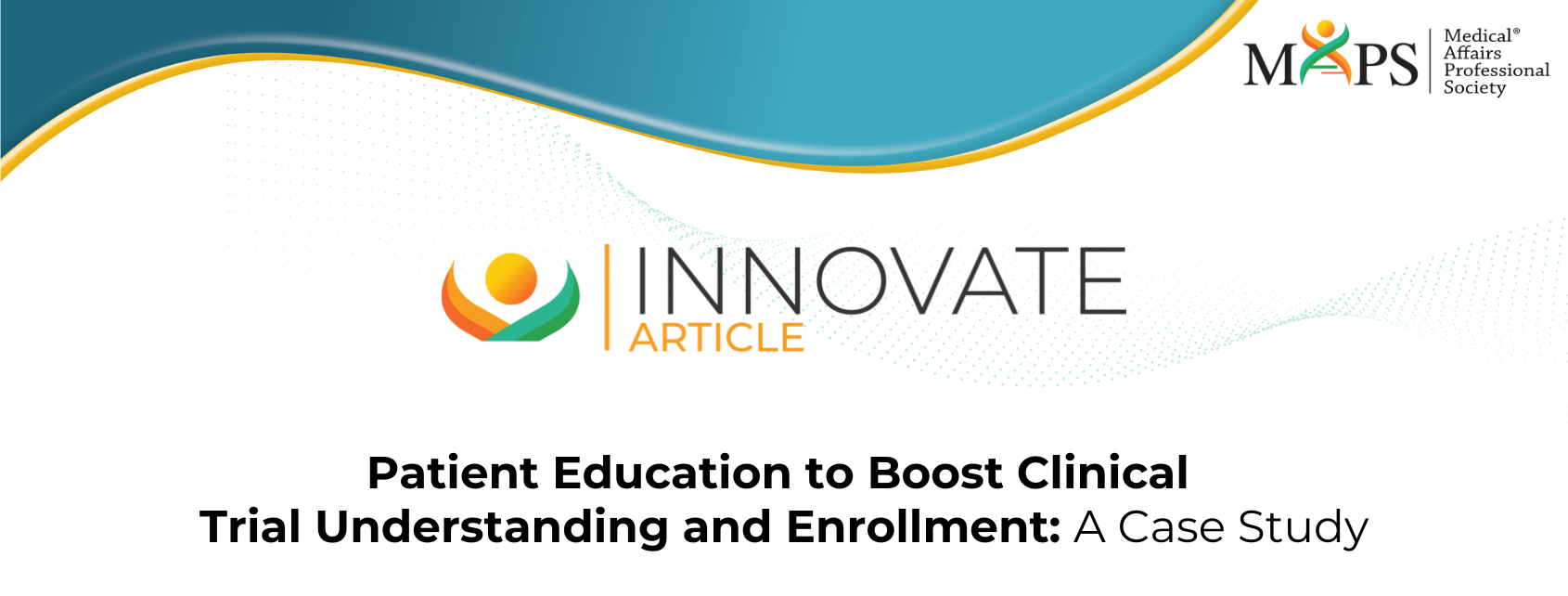
By Eric Peacock, cofounder and CEO of MyHealthTeams
One reason fewer than 5% of people with a chronic condition participate in clinical trials is that they do not understand, trust, nor hear about trials. Last month, medical affairs and clinical experts from six different organizations came together to help make clinical trials more accessible to and better understood by people facing vitiligo, a chronic dermatological condition. Hosted by MyVitiligoTeam, a social network of over 8,000 people diagnosed with vitiligo, and led by Dr. Amit Pandya, President of the Global Vitiligo Foundation, this live (virtual) event demystified trials and allowed organizations running active trials to present their trial directly to patients. We also heard from patients participating in trials. You can do this in your therapeutic area.
How It Worked
First off, Dr. Pandya, a noted KOL in vitiligo reached out to and recruited an amazing panel of clinical trial leaders in the space. No one hesitated to participate. The panel included:
- Kathleen Butler – executive medical director development, inflammation & autoimmunity at Incyte
- Kurt Brown – executive medical director development, inflammation & autoimmunity at Incyte
- Heidi S. Camp, PhD – senior scientific director, immunology clinical development at AbbVie
- Elizabeth Kirshner – VP of clinical research at Avita Medical
- Dawn Elaine Smilek, MD, PhD – chief medical officer, clinical trials group at the Immune Tolerance Network (ITN)
We promoted the event ahead of time on MyVitiligoTeam and recorded the event, so that those who could not make it live could watch it later.
Dr. Pandya opened with a presentation explaining how trials work and provided a list of questions patients should ask about any trial they are considering, such as:
- Is this study being conducted to determine what concentration of the medicine works?
- Is it going to be just for patients with localized vitiligo? Or also generalized?
- Is the drug being tested a topical cream, a pill, an injection, or something else?
- Has this treatment been effective in treating other diseases that are like vitiligo, such as alopecia areata?
- What is the logic behind this approach, and why do researchers think it will be effective?
Next, each panelist had 5 minutes to present their trials and answer questions from Dr. Pandya as well as pre-submitted questions from members of MyVitiligoTeam.
Where possible, the panelists did their best to replace clinical speech with consumer-friendly language explaining trials. They showed published results of trials and explained the safety protocols. They also talked about how participating in the trials might impact your day-to-day life (e.g. can you wear makeup during a trial that is using a topical biologic on the face?) .
I was especially pleased that we were able to bring two people living with vitiligo into the conversation as well. Both had participated in research studies previously and shared their experiences, along with practical advice for others potentially interested in joining a future trial. I have vitiligo myself and you can see the depigmented vitiligo area around my mouth. The two patients who had participated in the trial had similar spots but regained pigmentation during the trials. This provided a form of a “before and after” visual for patients to understand what efficacy looked like for these people.
It was a lively 90-minute interactive discussion, and the response from our community has been so positive. Well over 100 people registered for the event, and we’ve received a high volume of requests for a follow-up. Now we’re sharing the content more broadly across our vitiligo community, making the video playback available on-demand. We’re also hearing from partners in other disease states interested in replicating this approach for their patient population.
One specific thing about this event that resonated positively with our community was the collaborative nature of the conversation. In theory, the participating pharma companies are competing with each other – trying to drive interest and participation in their own clinical trial. That’s true, of course. But what’s also true is that these companies share a commitment to serving the unmet needs of vitiligo patients. That means developing new therapies and helping people understand why one trial might be better than another for them personally. Seeing experts from across the field in this context builds trust.
Any time we’re working with a pharma partner on a clinical trial project, we start by educating members about the benefits of participating in a trial – along with the process of how they work. We then surface multiple clinical trials, focusing on helping your audience find best-fit opportunities. Finally, we answer patients’ questions honestly and openly. I’m excited to see new ways that clinical trials are evolving to better reflect real-world patient priorities and experiences and I’m thrilled that Medical Affairs leaders are embracing the chance to engage and educate patients in health social networks.
Have ideas about how to build on this approach in your therapeutic area? I’d love to hear them. Reach out at [email protected].
Eric Peacock is cofounder and CEO of MyHealthTeams, creator of 41 condition-specific social networks for people diagnosed with a chronic disease.
The Innovate article series highlights the ideas of Medical Affairs thought leaders from across the biopharmaceutical and MedTech industries. To submit your article for consideration, please contact MAPS Communications Director, Garth Sundem.



